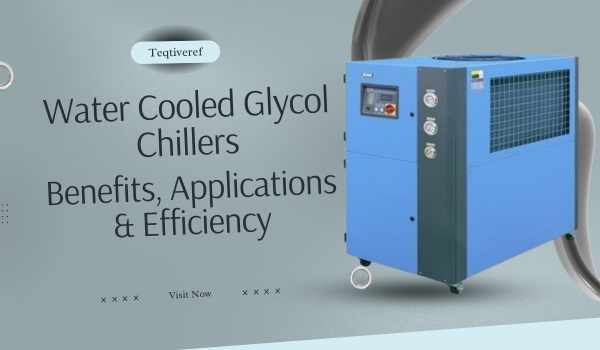
When it comes to industrial cooling, precision and reliability matter more than anything else. Factories, process industries, and commercial facilities all need efficient cooling solutions to keep operations running smoothly. Among the many technologies available, Water Cooled Glycol Chiller have emerged as a highly effective and energy-efficient option. But what exactly are they, how do they work, and why are industries worldwide relying on them? Let’s break it down in simple terms.
What is a Water Cooled Glycol Chiller?
A Water Cooled Glycol Chiller is a refrigeration system designed to cool processes or equipment by circulating a glycol-water mixture through a closed-loop system. Instead of using plain water, glycol (a type of antifreeze) is mixed in to prevent freezing, improve heat transfer, and provide consistent cooling performance.
Unlike air-cooled systems, which release heat directly into the air, a Water Cooled Chiller relies on a cooling tower or external water source to remove heat. This design makes them more energy-efficient, especially in large-scale industrial applications where cooling loads are significant.
Why Use Glycol in Chillers?
You might wonder, why not just use water? The answer lies in performance and protection. Water alone can freeze at 0°C, which limits its use in processes requiring sub-zero cooling. Adding glycol lowers the freezing point, allowing industries to achieve lower temperatures safely.
Other key advantages of glycol include:
Freeze protection: Ensures smooth operation in colder environments.
Corrosion resistance: Protects system components from rust and scale buildup.
Consistent cooling: Maintains stable temperatures, which is critical in sensitive processes like food, pharmaceuticals, and chemicals.
Benefits of Water Cooled Glycol Chillers
Investing in a Water Cooled Glycol Chiller comes with multiple advantages that directly impact productivity, energy savings, and system reliability.
1. Higher Energy Efficiency
Compared to air-cooled systems, Water Cooled Chillers consume less energy because water is a better conductor of heat than air. This results in lower electricity bills and reduced carbon footprint.
2. Precise Temperature Control
Many industries require cooling at very specific temperatures. With glycol in the system, these chillers can maintain stable and accurate cooling even in demanding conditions.
3. Compact Design
Because heat is rejected through water rather than air, Water Cooled Glycol Chillers are often smaller and quieter, making them suitable for indoor installation.
4. Long Equipment Life
The use of glycol prevents freezing and corrosion, reducing wear and tear on pipes, coils, and other components. This translates into longer equipment lifespan and fewer maintenance costs.
5. Versatility Across Industries
From breweries to chemical plants, these chillers adapt to a wide variety of industrial applications without compromising efficiency.
Key Applications of Water Cooled Glycol Chillers
The versatility of Water Cooled Brine Chillers and Water Cooled Glycol Chillers makes them indispensable in many sectors:
Food & Beverage Industry
Breweries, dairies, and food processors rely on glycol chillers for fermentation control, cold storage, and packaging processes. Consistent cooling ensures product quality and safety.Pharmaceuticals & Chemicals
Chemical reactions and pharmaceutical formulations often require strict temperature control. Water Cooled Screw Chillers paired with glycol provide reliable sub-zero cooling for these sensitive applications.Plastics & Rubber
Injection molding machines and extrusion lines generate a lot of heat. Glycol chillers keep the process stable, improving product quality and cycle times.HVAC & Commercial Buildings
Large commercial complexes use Water Cooled Chillers as part of centralized HVAC systems. With glycol in the mix, they gain added reliability during colder months.Industrial Process Cooling
From metal finishing to printing, any process generating heat can benefit from glycol chillers for steady and efficient cooling.
Efficiency Factors That Make the Difference
One of the biggest reasons industries are switching to Water Cooled Glycol Chillers is their superior efficiency. But what factors contribute to this performance?
Lower Condensing Temperatures – Since water removes heat more effectively than air, the compressor works less, saving energy.
Reduced Power Consumption – Water Cooled Screw Chillers are designed for heavy-duty applications with optimized compressors, leading to better energy savings.
Longer System Life – With controlled operation and protective glycol, the system doesn’t need frequent repairs, keeping downtime low.
Sustainable Cooling – Using green refrigerants and efficient designs, many modern Water Cooled Brine Chillers meet international energy and environmental standards.
Comparing Water Cooled Glycol Chillers with Other Options
When choosing a cooling system, businesses often compare between Air Cooled Chillers and Water Cooled Chillers. Here’s why glycol-based water-cooled systems often come out on top:
Air Cooled Systems: Easier to install but less efficient for large-scale operations.
Water Cooled Glycol Systems: Require a cooling tower, but the long-term energy savings and reliability often outweigh the initial setup cost.
Water Cooled Brine Chillers: Best for extremely low-temperature processes, often in chemical and pharmaceutical industries.
Water Cooled Screw Chillers: Designed for high-capacity applications, offering durability and energy optimization.
Final Thoughts
In today’s competitive industrial landscape, choosing the right cooling system is no longer optional—it’s essential. A Water Cooled Glycol Chiller offers the perfect balance of efficiency, reliability, and versatility. Whether you are in the food & beverage sector, pharmaceuticals, chemicals, or industrial manufacturing, these chillers ensure that your processes remain stable and energy-efficient.
By combining the natural advantages of water cooling with the protective qualities of glycol, businesses get a system that not only meets today’s cooling needs but is also future-ready. If efficiency, sustainability, and long-term performance are your priorities, then investing in a Water Cooled Chiller—especially a glycol-based one—might be the smartest decision you make for your operations.


Write a comment ...